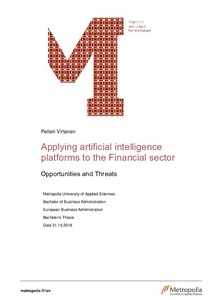Applying Artificial Intelligence Platforms to the Financial Sector: Opportunities and Threats
Virtanen, Petteri (2018)
Virtanen, Petteri
Metropolia Ammattikorkeakoulu
2018
All rights reserved
Julkaisun pysyvä osoite on
https://urn.fi/URN:NBN:fi:amk-2018112919027
https://urn.fi/URN:NBN:fi:amk-2018112919027
Tiivistelmä
This thesis gives insights for SME wealth management companies who consider to adopt Artificial Intelligence platforms it discusses, theories behind those, and in which way could wealth management companies benefit by applying the latest technologies. The thesis also discusses some of the regulatory standards and risk management tactics for AI applications.
FinTech applications are increasing trend as profits are harder gain. Currently, companies are looking new alternatives to save costs and relieve the workload of their employees. Artificial intelligence may provide new solutions to these problems.
Wealth management business has traditionally been a more exclusive field where only the wealthier individuals have gained access to different market information and theories behind it. After the 1970s however, this aspect has slowly changed, and different wealth management options have come to exist for nearly all customer segments. As investment banks are going for traditional banking as well, the demand from historically not so interesting customers is getting better wealth management services. The rise of FinTech especially in the millennial customer segment has created unique opportunities to create self-wealth management platforms, and some millennials are even getting rid of traditional wealth managers.
Are there some aspects that traditional wealth management houses could do to retain customers to switch new AI and Robot powered applications? One way is to implement these applications for the business itself to ease the fees for customers while cutting the costs down and increase efficiency at the same time.
There is a huge amount of different applications and regulation from which to choose. These applications and platforms also differ from each other. Nevertheless as technology proceeds it is a necessity for businesses, especially SMEs, to adopt at least to some extent these applications.
One major question is also, to what extent can a wealth manager trust AI? And whether wealth managers become extinct in the future?
FinTech applications are increasing trend as profits are harder gain. Currently, companies are looking new alternatives to save costs and relieve the workload of their employees. Artificial intelligence may provide new solutions to these problems.
Wealth management business has traditionally been a more exclusive field where only the wealthier individuals have gained access to different market information and theories behind it. After the 1970s however, this aspect has slowly changed, and different wealth management options have come to exist for nearly all customer segments. As investment banks are going for traditional banking as well, the demand from historically not so interesting customers is getting better wealth management services. The rise of FinTech especially in the millennial customer segment has created unique opportunities to create self-wealth management platforms, and some millennials are even getting rid of traditional wealth managers.
Are there some aspects that traditional wealth management houses could do to retain customers to switch new AI and Robot powered applications? One way is to implement these applications for the business itself to ease the fees for customers while cutting the costs down and increase efficiency at the same time.
There is a huge amount of different applications and regulation from which to choose. These applications and platforms also differ from each other. Nevertheless as technology proceeds it is a necessity for businesses, especially SMEs, to adopt at least to some extent these applications.
One major question is also, to what extent can a wealth manager trust AI? And whether wealth managers become extinct in the future?
